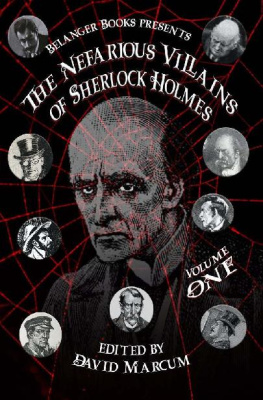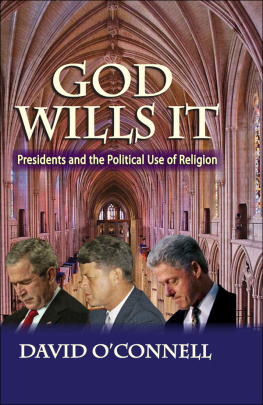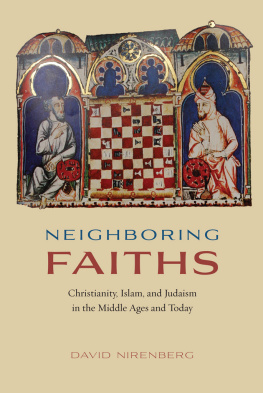David L. Holmes - The Faiths of the Postwar Presidents
Here you can read online David L. Holmes - The Faiths of the Postwar Presidents full text of the book (entire story) in english for free. Download pdf and epub, get meaning, cover and reviews about this ebook. year: 2012, publisher: University of Georgia Press, genre: Detective and thriller. Description of the work, (preface) as well as reviews are available. Best literature library LitArk.com created for fans of good reading and offers a wide selection of genres:
Romance novel
Science fiction
Adventure
Detective
Science
History
Home and family
Prose
Art
Politics
Computer
Non-fiction
Religion
Business
Children
Humor
Choose a favorite category and find really read worthwhile books. Enjoy immersion in the world of imagination, feel the emotions of the characters or learn something new for yourself, make an fascinating discovery.

- Book:The Faiths of the Postwar Presidents
- Author:
- Publisher:University of Georgia Press
- Genre:
- Year:2012
- Rating:5 / 5
- Favourites:Add to favourites
- Your mark:
- 100
- 1
- 2
- 3
- 4
- 5
The Faiths of the Postwar Presidents: summary, description and annotation
We offer to read an annotation, description, summary or preface (depends on what the author of the book "The Faiths of the Postwar Presidents" wrote himself). If you haven't found the necessary information about the book — write in the comments, we will try to find it.
The Faiths of the Postwar Presidents — read online for free the complete book (whole text) full work
Below is the text of the book, divided by pages. System saving the place of the last page read, allows you to conveniently read the book "The Faiths of the Postwar Presidents" online for free, without having to search again every time where you left off. Put a bookmark, and you can go to the page where you finished reading at any time.
Font size:
Interval:
Bookmark:

THE FAITHS OF THE
POSTWAR PRESIDENTS
George H. Shriver Lecture Series in Religion in American History No. 5
FROM TRUMAN TO OBAMA  David L. Holmes
David L. Holmes

2012 by the University of Georgia Press
Athens, Georgia 30602
www.ugapress.org
All rights reserved
Designed by Mindy Basinger Hill
Set in 11/15pt Adobe Jenson Pro
Printed and bound by Thomson-Shore
The paper in this book meets the guidelines for
permanence and durability of the Committee on
Production Guidelines for Book Longevity of the
Council on Library Resources.
Printed in the United States of America
12 13 14 15 16 C 5 4 3 2 1
Library of Congress Cataloging-in-Publication Data
Holmes, David L. (David Lynn)
The faiths of the postwar presidents: from Truman to Obama/
David L. Holmes; introduction by Martin E. Marty.
p. cm.d (George H. Shriver lecture series
in religion in American history; no. 5)
Includes bibliographical references and index.
ISBN-13: 978-0-8203-3862-0
ISBN-10: 0-8203-3862-1
1. PresidentsUnited StatesReligion.
2. PresidentsUnited StatesBiography. I. Title.
BR516.H63 201
973.920922dc23 2011029959
British Library Cataloging-in-Publication Data available
ISBN for this digital edition: 978-0-8203-3963-4
To James C. Livingston
by Martin E. Marty
No presidents story is complete until his deathand even then, reevaluations frequently occur. In the case of a sitting or recent president, assessments are especially subject to change. In certain ways, a book or chapter on such a president resembles a first draft.
This book went to press in the summer of 2011. In the months since, more than a dozen works on the postwar presidents have appeared. None changes in any significant way the evaluation of any presidents religious faith given in these pages. In September 2011, for example, the Kennedy Library released tapes of interviews conducted with Jacqueline Kennedy several months after her husbands assassination. Although her words would have provided color and detail, they support the revisionist interpretation of John F. Kennedys Roman Catholicism found in this book.
My thanks to the following alumni and students of the College of William and Mary who assisted in preparing this publication during the half-dozen years of its research and writing: Katelyn R. Browne, Jack E. Cohen, Leah R. Giles, Ann E. Glennie, Andrew E. Jungclaus, Jarrett W. Knight, Anna L. Krause, Susan M. Metallo, Wistar W. Murray, Hannah R. Perry, and Maggie E. Southwell. Additional thanks go to the staffs of the Swem Library at the College of William and Mary, the Alderman Library at the University of Virginia, and the nations presidential libraries.
The founders of the United States, both its leaders and ordinary citizens, had a problem: what to do about religion in the new republic. Those who had immigrated from Europe, remembering everything from corruption to holy wars, knew that in the hands of civil authorities religion could by force of law be used, and that rulers had used it. Heads of state might employ preferred faiths to endorse their own selfish policies, show favoritism in the public, or penalize those who dissented from officially approved creeds. The American colonists, now republicans, had just killed [off] the king in the Revolutionary War, so monarchs and governors could play no legally legitimated role in determining the civil place of religion. The thirteen former colonies differed among themselves in polities and policies. Some retained the establishment of religion with all the legal perquisites that went with it, while others fought for disestablishment and thus attempted to give a place for dissent against the favored faith. What should the citizens of 1787 and 1789 do?
It has been well said that the founders solved the problem of religion by not solving it. They drafted and approved the First Amendment to the Constitution with its classic clause barring Congress from making laws respecting the establishment of religion or prohibiting its free exercise. Earlier, in Article VI of the Constitution itself they had assured that no religious test should have any part in qualifying or disqualifying anyone from public office. But they did not go so far as to spell out the details, and they did not include anything about the religious role of the executive branch in the person or through the agency of the chief executive. That left a vacuum to be filled in a society of whose citizens President Dwight Eisenhower was to say, We are a religious people. He overshot in a second phrase, claiming on slight grounds that the nations laws presupposed belief in a supreme being.
This peoplereligious and nonreligioushas shown through the decades that the majority favors religious expression from the president. Willy-nilly, the president serves a kind of priestly role. When a spaceship explodes, when terrorists attack or enemies bomb, when publics need to employ someone with a voice to prod or to console, it falls on the president to resort to both rhetoric and example that sound and look religious by most definitions of that term.
David Holmes, who is so familiar with the sources that he sounds as if he is on speaking terms with the postWorld War II presidents, serves us well by showing how each of themagain, by rhetoric and examplesummoned the support of citizens. Sometimes they turned their rostrum into a bully pulpit, and sometimes they all but bullied people in the name of God to support their policies. Doing both of these in the role we have called priestly has been a bipartisan endeavor in which chance, accident, serendipity, and brutal designits partisan enemies always call this hypocrisyhave left generous records of religious-sounding rhetoric.
Fortunately, while Holmes does not trumpet the claim that he is non-partisan or bipartisan, as each presidents rhetoric usually is advertised, he finds that the gestures and sounds of the president cannot help but lean one way, the presidents way, and against all others. Reading histories of the responses to those gestures and that rhetoric, as Holmes does here often enough, provides illuminating access to the minds of the presidents as they tried to make history or live creatively with events occurring around them. While Europeans often call America secular and many Americans ruefully join them in that assessment, it has certainly been easier for chief executives to respond to religious interests or to try to impose them than it has been to remember the founding impulses. Holmes sorts these out.
Having had adult experience during all the tenures described in this book, and having written extensively on their era, I will stress that Holmes has chosen well from the sources on which he forms his narrative or makes his case. There are surprises, especially when presidents transcend partisan interests for a suprapartisan common good or when presidents having little formal theological training come up with theological interpretations of citizen action. Holmess manners are too controlled to permit him to propagandize, overstate cases, or lose his way in the maze of presidential politics, so he comes across as an intelligent, fair-minded, and reliable guide.
Next pageFont size:
Interval:
Bookmark:
Similar books «The Faiths of the Postwar Presidents»
Look at similar books to The Faiths of the Postwar Presidents. We have selected literature similar in name and meaning in the hope of providing readers with more options to find new, interesting, not yet read works.
Discussion, reviews of the book The Faiths of the Postwar Presidents and just readers' own opinions. Leave your comments, write what you think about the work, its meaning or the main characters. Specify what exactly you liked and what you didn't like, and why you think so.






